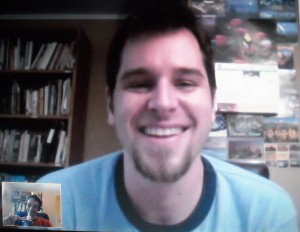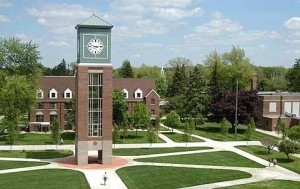Last week I began a Chasing Wisdom series based up my Skype interview with Nathan Foster, Assistant Professor of Social Work, Spring Arbor University, Spring Arbor, MI. In the first post, I focused upon how a private person, such as Nathan, wrote such an open book about his life, struggles, family, and vocation.

Today, we’ll explore
- becoming a wisdom chaser in higher education
- discerning the call to higher education
- being present to one’s family
Next week we’ll consider
- power in the classroom from the perspective of the teacher
- taking the first steps in teaching
- how InterVarsity Christian Fellowship can journey with academics
And in case you were wondering, Nathan’s keeping an eye on the series and would love to respond to your comments. So please, take advantage of the opportunity!
Thomas B. Grosh IV: What do academics chase? Is it wisdom? Based on insights from your journey and that of your father’s, what would you say to encourage Emerging Scholars to become wisdom chasers?
Nathan Foster: Your question about education and wisdom is great. I worked at a place once and they didn’t like to hire people with advanced degrees. And I said, “That’s crazy. Why not?” They thought [those with advanced degrees] become very arrogant and lost their ability to be teachable. Don’t get me wrong education’s great and I’m a huge fan of it. Personally I love to learn. But it’s good for me to remember that there are potentially negative consequences from education. We can get a little stuck up and we can lose some of our humility. My wife calls it professoritis. We tend to think that we’re right about things. Now part of that comes from certain expectations. When you’re teaching, people expect you to have the answers and they look to you to have the answers. And so we get used to being right. I’ve found it very seldom that students really challenge us on some of what we spout off.
I got a couple of good disciplines I try to practice to fight my professoritis. …
- I’ve observed that good professors learn from students.
- I try to create an environment in which there is an expectation that students need to bring material, research or insights to contribute to the overall learning environment.
- I’m quick to compliment and acknowledge when something is new to me.
- It’s a powerful blow to my ego when I admit I’m wrong or don’t know the answer to a question. I work hard and read and have these ideas from piecing things together, but better people than me have been wrong. Am I willing to admit to a class that I’m wrong? It’s good for my soul when I do.
TG: What led you to discern “a call” to higher education?
NF: When I had the counseling practice, each week I’d do supervision with a handful of employees. I found it to be my favorite part of the day. So I found myself much more interested in that than doing therapy. I just got this bug in me that I wanted to teach. I loved being a social worker, but now I get to train the helpers, what an honor. It’s maybe a little bit like what you do. Pour myself into people who are pouring themselves into other people. So, I thought this is what I want to do. When I started thinking about teaching I couldn’t sleep for months. I was so excited. So I went to Southeast Kentucky in the middle of nowhere and I really enjoyed teaching and helping.
I would see myself more as a co-laborer with people than the sage on the stage idea. That’s not me. I wouldn’t necessarily see myself as a scholar. I read stuff and try to stay current on what’s going on, but I try to teach more from an interactive approach. So for me, the best compliment a student can give to me is, “It’s like you’re learning alongside with us.” A colleague of mine who is a sharp literature guy has a line where he’s talking about a poem or book and then he stops and says, “But what do I know? Let me hear from you.” And that’s really where I expect students to come up with things and teach me things. If I can facilitate an environment where there is a synergy with the group then I feel like I’ve done my job. So scholar as follower. Scholar as finding and enabling the strengths in my students would be the direction I think.
TG: What would you suggest to Emerging Scholars with families as they seek to be ‘present’ to their spouse, child(ren)?
NF: I think that the first place is to realize what is important. At the end of the day and life, what matters is how we loved those in our home, especially the kids in our own home. You can have lots of students or therapists, but my daughter and my son only have one dad. My wife has only one 1st husband. What happens in academia or ministry is we get lots of accolades; we get to be a superstar. But when we’re home, we’re not necessarily praised. There is an ego piece, basing our identity on what we do. It’s very American especially for men with their professional aspirations.
If our identity is rooted in being loved by God, our task is to love others, at work and at home. First, ministry is at home. I struggle with ministry at home. It’s easier to work. Home is a puzzle with lots of pieces. I’ve begun viewing my work with my kids as a task. I tend to be obsessive with my to do list, especially in the summer. So I put on my list everyday to love extravagantly, e.g., coloring with my son, reading with my daughter, doing dishes. It helps me. The other day a neighbor kid came over. He’s one of those kids who seems starved for male attention. I’m out mowing the lawn and I’m in a hurry. He asked to help, and I let him. It took twice as long. As far as economy of kingdom, I think I did a lot that day. I got to give and it was so easy …
My kids both seem to be going through the stage where they like to talk incessantly about nothing. I want to encourage connection, but I have this bad habit of tuning them out. One day I had the picture that I’m teaching them not to listen. If I don’t listen to them, why would I expect them to listen to me when they get older? I wonder if I earn the right to be heard by listening to them?
As parents we’re scared our kids won’t make good choices. In the end what’s important is that we have relationship with them; that we’re able to be a presence in their life, guiding, loving, and helping them pick up the pieces when things fall apart. I hope I’m able to still encourage my kids. I hope I have the courage to be a good dad. I think men in our society are lost trying to find their place in the family, I know I am. We’re moving beyond the old idea that our role is to have a respectable job and support the family financially or make sure that they have all the creature comforts they want. So what is our role in the family? What does it mean to love our wife as Christ loves the Church? What does it mean to love our children? Like most things in life, I have more questions than I have answers. …
[Come back next week, when Nathan comments on power in the classroom, “we’re extremely powerful in teaching, but also in writing and speaking. So I would say, acknowledge it’s there. Don’t deny it. But it can be used for good and we can’t use it for good if we’re denying it. …”]
Tom enjoys daily conversations regarding living out the Biblical Story with his wife Theresa and their four girls, around the block, at Elizabethtown Brethren in Christ Church (where he teaches adult electives and co-leads a small group), among healthcare professionals as the Northeast Regional Director for the Christian Medical & Dental Associations (CMDA), and in higher ed as a volunteer with the Emerging Scholars Network (ESN). For a number of years, the Christian Medical Society / CMDA at Penn State College of Medicine was the hub of his ministry with CMDA. Note: Tom served with InterVarsity Christian Fellowship / USA for 20+ years, including 6+ years as the Associate Director of ESN. He has written for the ESN blog from its launch in August 2008. He has studied Biology (B.S.), Higher Education (M.A.), Spiritual Direction (Certificate), Spiritual Formation (M.A.R.), Ministry to Emerging Generations (D.Min.). To God be the glory!


Sounds like you create a really engaging learning environment where all participants are expected to contribute rather than just an ego driven talking head. I always learned best in these types of environments. I would say that this teaching you you strive to carry on at home is also a form of demonstrating the vital skill of listening to each other and learning how to engage with one another, live together, and collaborate. I think the notion that it is harder to do at home is spot on from my own personal experience.
Thanks, David. This is definitely the environment I try to create. But you’d have to ask my students to know for sure. I think that my roll as a professor is more black and white than my role as a husband and father. Balancing the grey can be pretty confusing at times.